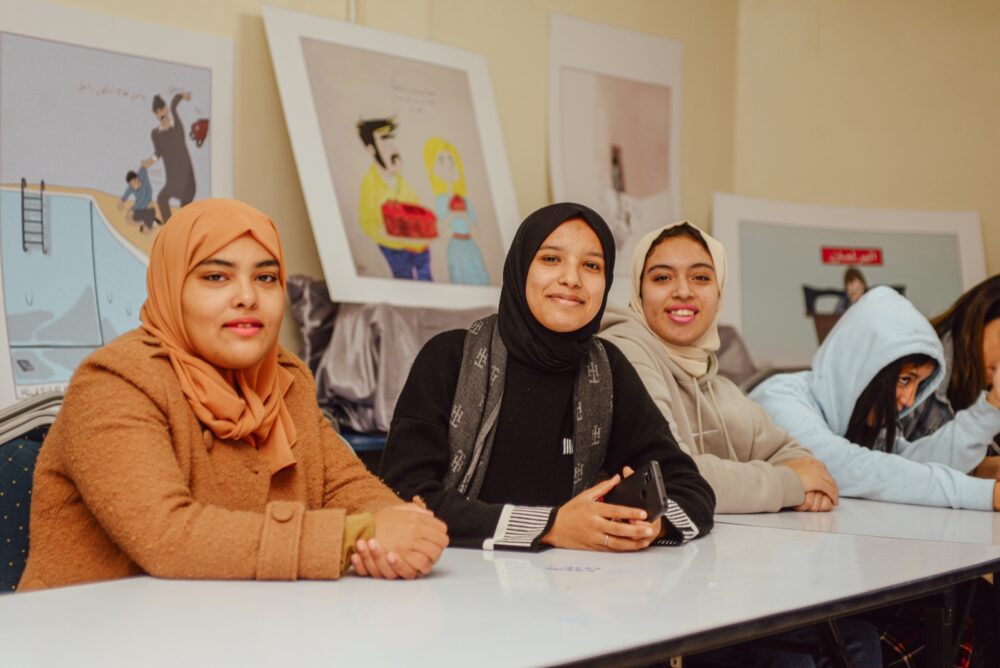Related
Read our latest articles, studies and columns on sexual health and rights.
In Morocco, Generation G partner Medias et Cultures, have designed an innovative advocacy campaign using cartoons created by women to push for long overdue change to the country’s discriminatory Family Code.

To Abdelmajid Moudni, executive director of Medias et Cultures, the female artists who created cartoons for the Sotek Sarut (Your voice is a key) campaign are its driving force. “Young women who fight every day…to make their voice heard and to advocate for their needs,” he says. “They are the true heroes of this campaign.”
The Sotek Sarut campaign is part of wider advocacy work driven by Hiya, the Moroccan women’s rights movement, to reform the Moudawana or Family Code. The code came into force in 2004, and although parts were intended to improve women’s rights, it is hugely discriminatory against women and girls. But after many false starts, Moroccan parliament appears to be ready to make changes.
“The code doesn't recognise women as having legal rights, whether it is for herself or on her child. The first goal is to change its patriarchal spirit. The second is to address the code’s nine injustices.”Abdelmajid Moudni
These injustices relate to key things in the code that deny women and girls their rights. For example, although the legal age of marriage is 18, a family judge can grant expceptions and 13,000 children – mainly girls – are married every year as a result. But despite a well organised movement, public opinion on reform remains divided.
The need to find an advocacy approach that would connect with different parts of Moroccan society led Médias et Cultures to partner with fellow Hiya members INK, which represents graphic artists, and Kif Mama Kif Baba. Together, they have created an innovative visual campaign linked to the 16 Days of Activism Against Gender-Based Violence (25 November -10 December). To start, INK invited young female Moroccan artists in its network to create cartoons based on the theme Drawing the new family code 2.0, depicting one of the nine injustices. Abdelmajid adds:
“We wanted to think outside of the box, to come up with a less formal approach with broader public appeal. And we can say so much more with one cartoon than we can with 100 words.”
Twenty-seven women aged 18-32 submitted 20 cartoons each, many of which focused on child marriage and legal guardianship. Cartoons from ten artists were selected for the final campaign. None of the entrants are professional cartoonists but are driven by a passion for their art and for women’s rights.

Abdelmajid adds: “These cartoons are created by young women to speak to every generation of women, from little girls onwards. Cartoons can reach across society, across classes, not just to women and girls but to men and boys…You don’t need to be part of a certain group or to have certain beliefs to be drawn to it.”
One of the selected artists is Amina Faiz, whose cartoon Sir, the husband shows a girl being driven off by an older man after being married. “We shared our lives, poured our souls, into these stories, and tried to depict the reality of women as we see and live it,” she says. “We attempted to be the voice of all those women who couldn’t speak up loud and clear, who couldn’t scream their pain and struggles and demand their rights.”

In December 2023, the selected artworks were shared across the partners’ platforms in a digital campaign inviting women and girls to express their demands using the hashtag #SotukSarout. The cartoons were also exhibited in Casablanca on 2 December.
From mid-December, a series of workshops for women and girls, young people and allies in Marrakesh, Beni Mellal and Settat shared the campaign, advocacy progress on the nine injustices alongside advice for young women interested in becoming cartoonists. Campaign partners have also contacted each of Morocco’s 27 political parties to offer the artworks for display in their headquarters. Three positive responses have been received so far.
Abdelmajid says taking a different approach to advocacy has been particularly effective: “It had a low budget, but the effect is so broad and more impactful than other approaches that would have cost more.”
“Ultimately, the campaign’s strength lies in its ability to demonstrate women’s solidarity in Morocco. ”
“This aspect is really the change we want to see,” says Abdelmajid. “Women should help each other towards a better future, and solidarity is the main goal to achieving this. What is very beautiful is that each cartoon represents what’s dark within our society and how, together, we can change it. That’s a powerful message.”
Read our latest articles, studies and columns on sexual health and rights.
Uw browser (Internet Explorer 11) is verouderd en wordt niet meer ondersteund. Hierdoor werkt deze website mogelijk niet juist. Installeer Google Chrome of update uw browser voor meer internetveiligheid en een beter weergave.